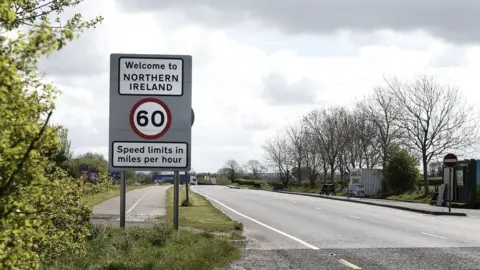Brexit: Non-Irish EU citizens could face Irish border travel checks
 Getty Images
Getty ImagesNon-Irish EU citizens living in the Republic of Ireland will have to apply online for pre-travel clearance to cross the Irish border under proposed new legislation.
The bill, now working its way through Westminster and due to come into effect in 2025, has been criticised by Sinn Féin, the SDLP and Alliance.
It is part of the UK's attempt to control immigration post-Brexit.
It has passed the House of Commons but has yet to be voted on by the Lords.
The measure would require all non-Irish EU citizens - and those from Norway, Liechtenstein and Iceland - living in the Republic of Ireland to apply for an electronic travel authorisation (ETA) to cross the border.
It is similar to what international passengers have to fill in before arriving in the United States or Canada.
The British government says it is simply an online form and once completed can be easily renewed.
But the SDLP and Alliance say it adds to bureaucracy and is unenforceable because there are no border checkpoints.
'Collateral damage'
Opponents of the bill say many non-Irish EU citizens living in the Republic cross the border only weekly and for at most for a couple of hours to do shopping.
Sinn Féin's Pearse Doherty, a member of the Dáil (lower house of Irish parliament) said the proposed law proved the British government "doesn't give a damn" about Ireland or the Good Friday Agreement, which he said were once again "facing collateral damage" from Brexit.
Responding in the Dáil, Tánaiste (Irish Deputy Prime Minister) Leo Varadkar said the bill should come as no surprise to anyone, as taking back control of borders was a central theme in the Brexit debate.
He added that the Irish government would be making its "concerns and our objections" known.
The development at Westminster comes at a time when the Irish government is announcing a cross-border fund of €1bn (£860m) for green projects including new cycling greenway routes.
If the British measure becomes law, and is not amended, non-Irish EU citizens would technically have to apply for an ETA to cycle from a border county in the Republic of Ireland into Northern Ireland even for a leisurely journey.
